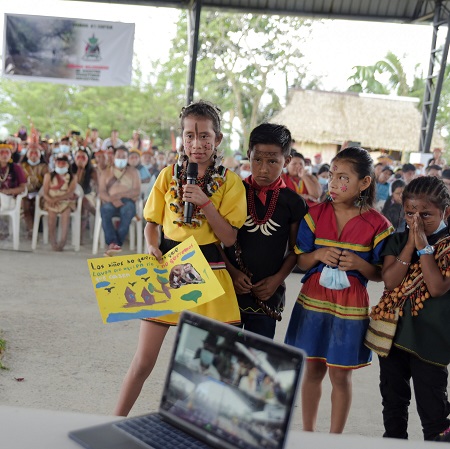Ecuador Court: FPIC for Indigenous Peoples

Consistent with the UN Declaration on the Rights of Indigenous People, Ecuador’s Constitutional Court has recognized indigenous peoples’ right to free, prior and informed consent (FPIC). This new ruling is a potential step toward the environmental justice that has been denied to indigenous peoples over centuries of colonization.
In January 2018, the Cofán indigenous people’s Guardian Indigena of Sinangoe, comprising 20 people chosen by the community, in Sucumbíos Province, Ecuador, discovered heavy gold-mining machinery on their territory along the Aguarico River near Cayambe Coca National Park, mining the riverbed and polluting the waters. As they had never been consulted about any mining projects, they decided to protest this violation of their substantive land and environmental rights and their process right to prior and meaningful consultation, which are guaranteed in the Ecuadoran Constitution.
Ecuador’s highest court issued the ruling on 4 February 2022 after reviewing Sinangoe’s 2018 lawsuit, in which the community sued three government ministries for selling mining concessions on their territory without consultation, in violation of the constitution. Provincial judges already had ruled in favor of the community and its rights of nature, overturning 52 mining concessions. Sucumbíos provincial court has ordered that the mining concessions already in operation on territory claimed by the Cofán indigenous people, and those currently in the process of being granted be canceled, affecting some 324 square kilometers in total.
The ruling also requires that reparations be made for any impacts caused by recent mining. However, the Constitutional Court took a step further to make the indigenous people’s rights applicable statewide. Moreover, it reaffirmed their rights to water, a healthy environment, and the rights of nature, themes that were included in the community’s initial complaint, but not recognized in the lower court’s first decision.
After having reviewed the evidence and traveling to Sinangoe to conduct a historic hearing in indigenous territory last November, the High Court judges found that extraction activities violated a bundle of the community’s rights. These include their right to be consulted in advance of extractive projects developed on their land.
The new 39-page ruling now compels the state to ensure that communities undergo a consultation process before any extractive activity is planned on or near their territory. The Court specified also that the consultative process must be “clear and accessible” for the whole community, and with the purpose of “obtaining consent or reaching an agreement with” the communities.
Ecuador’s highest court gives indigenous groups the final decision on oil, mining and other extractive projects that may affect their lands. The ruling, which requires the government to seek consent for new projects, could stifle President Guillermo Lasso’s plan to double oil production.
For the community, the court’s decision is a victory that represents a milestone for the rights of all indigenous communities demanding the right to FPIC in Ecuador and beyond. According to the ruling, if an Indigenous community refuses a project, the government can still move forward in “exceptional cases.” But it also states that “under no circumstances can a project be carried out that generates excessive sacrifices to the collective rights of communities and nature.”
Photo: Children from the A’i Cofán community addressed judges who had traveled to Sinangoe, Ecuador, in November to hear from Native groups. Source: Johanna Alarcon/Reuters.
|